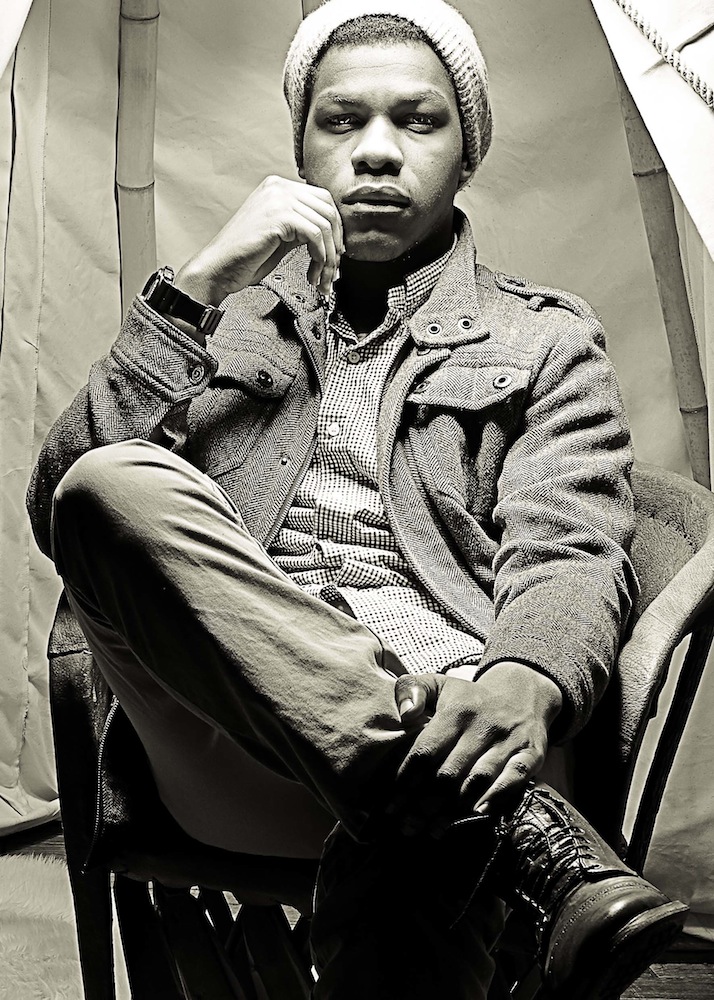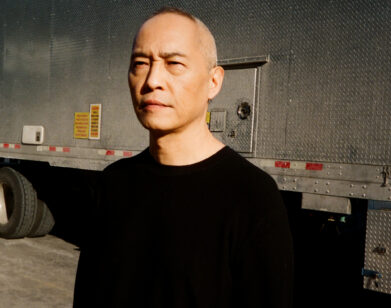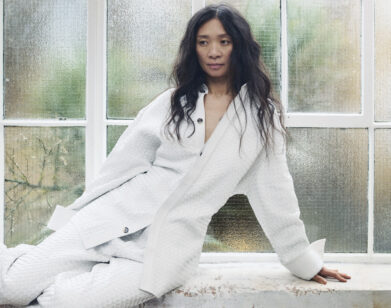John Boyega: The Best of Next

ABOVE: JOHN BOYEGA AT THE SNOW LODGE IN PARK CITY, UTAH. JANUARY 2014.
“The softer the name, the harder the man,” states Bambi, the protagonist of Malik Vitthal’s Sundance entry Imperial Dreams. Played by young British actor John Boyega, Bambi exemplifies this maxim. Twenty-one years old and fresh out of jail, Bambi is determined to get out of Imperial Courts, the Watts, California housing project he’s lived in his entire life. The world doesn’t make it easy for him: his mother is a crack addict, his girlfriend is incarcerated, his cousin and best friend is on the run, and his brother is a few hundred dollars short of being able to afford his Howard University scholarship. Shrimp, the drug-dealer uncle who raised him, wants Bambi to be his right-hand man. He can’t get a job because of his criminal record, but he needs a job to retain custody of his son, Day, played by two remarkable young actors, Ethan and Justin Coach. But Bambi is smart—he wants to be a writer and published a story in McSweeney’s while in prison—and charming. He’s a character Boyega is passionate about, and it shows in the pathos with which he portrays Bambi.
On Saturday, Imperial Dreams won the “Best of Next” Award at the Sundance Film Festival. Earlier in the week, Boyega was officially cast as Olympian Jesse Owens in the upcoming biopic Race. Other promising projects on the young actor’s résumé include a reboot of 24 with Stephen Fry and the film adaptation of Chimamanda Ngozi Adichie‘s Half of a Yellow Sun, starring Thandie Newton and 2013’s sky-rocketing star, Chiwetel Ejiofor.
We first met Boyega, whose favorite actors include Sam Rockwell, Anthony Hopkins, and David Oyelowo, after his debut feature film in 2011. Last week, we sat down with him again at The Snow Lodge on Main Street in Park City, Utah.
EMMA BROWN: How did they end up casting a London boy to play someone from Watts, California?
JOHN BOYEGA: I got the script from my agent. I was at home having a full English breakfast and the email came through in my junkmail. Funnily enough, I was paying a T-Mobile bill, so I was able to see the email. After that I was engaged in the story. I was scared—fearful—because the story doesn’t just penetrate one level in terms of narrative; it goes that level after. You could easily play the guy as straight-up hood throughout the whole movie, but [writer and director] Malik [Vitthal] envisioned a human being that has never been seen before in film: a black man in circumstances that he does not like, who is passionate—persistent—in turning it around.
BROWN: In spite of everything that Bambi goes through, there is a certain optimism to the film.
BOYEGA: Yeah, that’s something that I was passionate about from the get-go. Some people feel fulfillment from a bitter end—it gives them some sort of sense of reality. But, when you’re dealing with reality, I feel like films should discover the part that is happy. That’s also reality. Things working out is a reality. It’s encouraging. You take your audience through such a story where they have to invest their energy and emotion, and to slap them in the face with, “Well, this is how life is. Bye,” wouldn’t have been as great as the ending that we have, which is optimistic and hopeful. It’s not happy 100%, but it does make you feel like, “This kid may just be okay.”
BROWN: Imperial Courts is a real place. Did you go through culture shock at all when you first visited it?
BOYEGA: No. We’ve grown up with American movies. Not to say that American movies—or movies that have been based in Watts, Compton, or Inglewood—are a 100% true depiction of that world. But also you have inner-city London, and the foundations are pretty much the same. Especially me, growing up in Southeast London, in Peckham. But to me it wasn’t a culture shock; it was more of a culture realization. I just realized certain things weren’t the way I saw them to be. It was amazing meeting all these different people who are forced—in a sense and to a certain extent, because there are some who do things from their own free will—but for those that do things from circumstance, they have to put on a mask to be a warrior. It’s terrible that they have to do that. It feels like they have to do it to survive. I appreciate everybody in Imperial Courts; they were amazing. They took off that façade for me—that mask—and were just people. They spoke about their dreams, they spoke about what they enjoyed. That’s what powers the film, that’s the passionate core of the film. People who are misviewed in these movies as one person, when they are so cultured and they love art. And that’s something that this movie really pushes.
BROWN: What I found particularly striking was the disparity between the sense of community in Imperial Courts and the constant tension between residents. On the one hand, everyone seems to know everyone, when Bambi gets released from prison he is welcomed by old friends and told, “I love you, man.” But it is also a very violent community and, like you said, there’s this idea of having to present a mask of strength.
BOYEGA: That’s something that’s very important. You have to realize that for some of these people—definitely me when I was growing up—you treat every day like it’s your last, because that’s the reality of your situation. You never know when someone’s going to go, because you’re living in a war zone. It’s almost like you’re in a jungle, and you’re just waiting for the predator to catch everybody one by one. So everybody cherishes each other. Instead of calling people the n-word, you’re calling people “loved one.” There is a level of appreciation for brothers and sisters in the hood. You’ve got to appreciate the person, because it’s the reality: they may die. For people like us, that reality is watered down. But for them, they live and breathe that stuff. I think it’s amazing. It definitely should teach us—the rest of the world—how to truly love. I’m glad you said, “It’s so bizarre to me,” because that’s what we’re trying to do—we’re trying to attack this story, this genre, from a different point of view. Based on the history of films [about the hood], it may be difficult for people to accept that this film is different. Because in our minds, we’re just seeing the same thing. But the tones in this movie were made very apparent through dialogue, through character traits, through the arc of each character.
BROWN: Do you feel like the black independent film industry has grown over the past few years?
BOYEGA: I’m not going to answer you as if I know everything about this—it’s an ongoing education for me, I’ve only been three years in the industry—but I would say from my observations, my personal opinions, that the world in Hollywood and all the big movies has been built up as just white. There’s an issue, ’cause that’s not the world. Walk down Main Street and you know that’s not the world. Hollywood is so fixated on keeping it that way because it’s generating the buzz, but that representation isn’t right. I definitely feel like it’s getting better—it’s not only for blacks, but for people that are of all different skin colors. It is very important that black independent films get seen. We need to start getting used to black people. They exist. And they’ve been around for a long time. It’s amazing that people still feel, “Oh my gosh, it’s a black guy.” We’ve been here for a long time, let’s get used to it. Let’s get used to other cultures. Portray the world for what it is and you will find truth.
BROWN: It’s true for female roles in Hollywood as well.
BOYEGA: Oh yeah! Every time I go out in London, I’m not always with my guys. I have three female friends that I’ll go out with all the time. I’m the only guy there. Explore that. That’s the world. We start living in this world where, because those films generate the money, the story stays fixated there.
BROWN: Tell me about your family. Did you come from a family where being an actor was a feasible goal?
BOYEGA: No. My dad is a minister and my mum is a worker with the less fortunate and the disabled. They’re Nigerian natives. Their first language is Yoruba, and their second language is English. My mum and dad moved to London when they had my eldest sister. They started a life in London as immigrants, and they built up from there. They’re no actors in my family, but there are definitely animated black people in my family. My dad’s a Pentecostal minister, meaning that he’s full of charisma. If he’s telling a story about Noah’s ark, you best know each tiger is going to be having their own little conversation and narrative.
BROWN: What are you up to now?
BOYEGA: I just joined the TV show 24, which is filming when I get back to London next week. I’m playing an American, but it’s based in London, so I get to be at home and mess around with Jack Bauer. I have a movie coming out this summer; it’s called Half of a Yellow Sun. It got a buyer from the Toronto film festival, so it’s got US distribution early this summer. It’s me, Anika Noni Rose, who also stars in Imperial Dreams, Thandie Newton, and Chiwetel Ejiofor—who’s just, like, gone with the wind.
BROWN: Do you like London?
BOYEGA: I love London. I’m a London fanatic. That’s my city. I love being from there, you don’t appreciate it until you go out. I can’t wait to film 24 there.
BROWN: Do you have aspirations to write or direct?
BOYEGA: Right now I’m developing a show with a couple of actors I’ve worked with. I want to tell the story of the black experience pre-slavery. When I say pre-slavery, I mean in Roman times when you had loads of black saints, black priests, and black kings. I’ve had this idea and hopefully the pitch goes well. I’m producing a movie called The Dream Collector, which will be shooting in South Africa very soon. I never wanted to do producing, I came into this solely wanting to act, but I’ve somewhat grown a personal mission: I want to see more people of different backgrounds being cast in films. I want to see people from inner cities being discovered, because that’s where you find some really brilliant artists.
I think what Robert Redford established is amazing; thank god for Robert Redford. He’s set an amazing example with Sundance and I hope to follow that in my own way. I’ve got to leave something behind. Not everybody has that mentality and that’s fine, but once Robert Redford leaves this earth—later rather than sooner—his legacy will go on. Not just because of his roles, but because he made an avenue for people whose films may not have been seen. Even if they don’t get buyers or distributors, they will feel some sort of happiness and hope: “I am in a theater, watching my movie.”
For more from Sundance 2014, click here.






